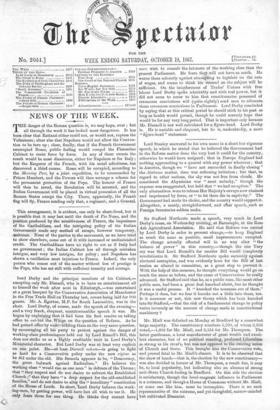Lord Derby and the principal members of his Cabinet,— excepting
only Mr. Disraeli, who is to have an entertainment all to himself the week after next in Edinburgh,—was entertained at a great banquet by the Conservative Association of Manchester in the Free Trade Hall on Thursday last, covers being laid for 900 guests. Mr. A. Egerton, M.P. for South Lancashire, was in the chair. Lord Derby, of course, made the speech of the evening— and a very frank, eloquent, unstatesmanlike speech it was. He began by explaining that it had been his first resolve on taking office to out-bid the Whigs on the question of Reform. As be had gained office by under-bidding them on the very same question, by encouraging all his party to protest against the danger of working-class predominance held out by Lord Russell's Bill, this does not strike us as a highly creditable trait in Lord Derby's Ministerial character. But Lord Derby was at least very explicit on one point. He—at least Disraeli volente—is going to fight as hard for a Conservative policy under the new regime as he did under the old. His formula appears to be, " Democracy, the great bulwark against Radicalism." He believes the working class " would rise as one man" in defence of the Throne; that " they respect and do not desire to subvert the Established Church ;" that they have " a deep respect for the old-established families," and do not desire to alter the" hereditary" constitution of the House of Lords. In short, Lord Derby believes the work- ing-men, by getting power, will have lost all wish to use it. He only fears them for one thing. He thinks they cannot have more wish to consult the interests of the working class than the present Parliament. He fears Ahoy. will not have so much. He warns them solemnly against attettiPng to legislate on the rate of wages, and seems to think his &sunset on the subject will be sufficient. On the interferences of Trades' Unions with free labour Lord Derby spoke admirably and with real power, but it did not seem to occur to him that constituencies, possessed of erroneous convictions will (quite rightly) send men to advocate, those erroneous convictions in Parliament. Lord Derby concluded by saying that at this critical period he should stick to his post as long as health would permit, though he could scarcely hope that would be for any very long period. That is important only because Mr. Disraeli is not well calculated for a figure-head. Lord Derby is. He is amiable and eloquent, but he is, undoubtedly, a mere " figure-head " statesman.






























